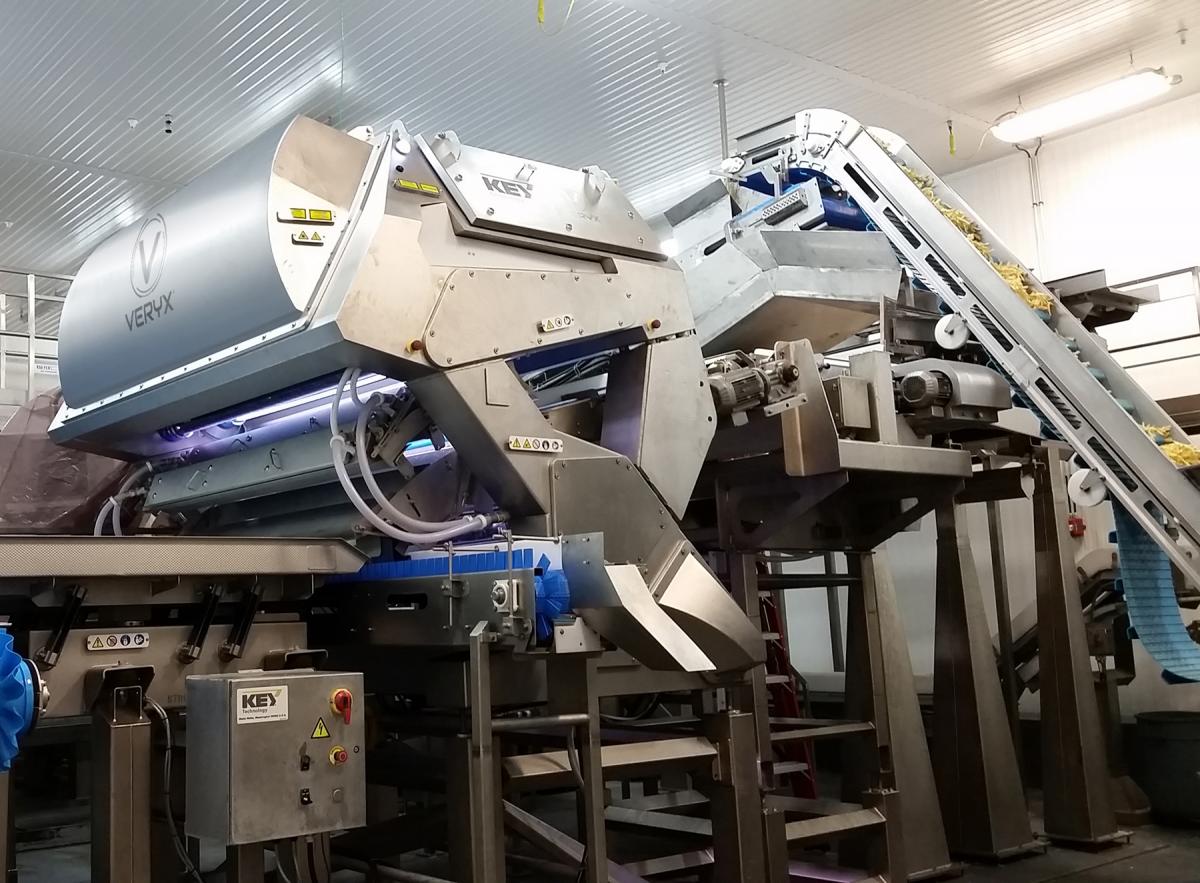VERYX® digital sorters are equipped with Key Technology’s Sort-to-Grade™ (STG) software for both wet and frozen potato strips, adding to the machines’ capability to remove all foreign materials, and pass predetermined criteria with little human intervention.
STG can recognize and categorize surface defects and the dimensional characteristics of each strip and makes each accept/reject decision based on how it will impact the aggregate ‘in the bag’ grade as defined by the processor. By controlling the output for defect types that must be managed to a particular grade or “spec,” VERYX with STG accurately maintains the most complex final product specifications without operator intervention while increasing yields by 1%-3% and enabling processors to eliminate mechanical length grading.
“When Key introduced the world’s first Sort-to-Grade capability for our legacy sorters four years ago, it transformed how processors can sort potato strips. Since then, we’ve been continually refining the software to enhance its functionality and process value. Now, we’re introducing Sort-to-Grade for our advanced VERYX sorters,” said Marco Azzaretti, Advanced Inspection Systems Product Manager at Key.

When the target grade permits a certain measure of minor defects to be present, a VERYX STG sorter will pass only the allowed amount of that defect type. By controlling the quality of the output to a defined grade, STG ensures the final product specification is consistently met, maximizing process yield. The intelligent STG software algorithms operate fully automatically, eliminating the need for manual adjustments and reducing the need for operator intervention.
STG can profile the length of each potato strip as well as any surface defects that may appear on the potato strip. VERYX with STG can be programmed to reject strips that are too short or too long for the grade while managing the distribution of strip lengths within multiple user-defined categories (“length bins”) between those two absolutes. If the grade allows for a given percentage of all strips to be between X and Y in length, another percentage to be between Y and Z in length and so on, STG will make accept/reject decisions to deliver exactly the required length profile.
“This length sorting capability has game-changing implications – it means a processor can eliminate mechanical length grading equipment,” explained Azzaretti. “Compared to mechanical graders, an intelligent length-grading digital sorter like VERYX offers many advantages. Of course, the sorter removes FM and defects at the same time it is length-grading, which adds enormous value. By eliminating mechanical graders, the processor reduces their capital costs and frees up floor space at the same time they remove a potential source of FM introduction and reduce maintenance and sanitation expense. Also, operational versatility is significantly improved because a sorter’s length grading parameters are instantly managed on the user interface, without having to make mechanical adjustments.”
All sorters make accept/reject decisions by comparing the defect and/or the dimensions of each object to predetermined criteria. Without STG, those decisions are made as a sequence of one-off decisions, regardless of final ‘in the bag’ quality results. Historically, an operator has had to adjust the sorter’s accept/reject thresholds subjectively in an effort to make grade given inevitable fluctuations in the quality of incoming product. This traditional approach to sorting can result in too many defects being rejected, creating significant yield loss and, when incoming defect loads spike, final grade specifications can be missed.
“Like ‘cruise control’ on a vehicle, STG automates adjustments to dynamically maintain a consistent outcome despite constant variations in incoming product quality characteristics. Our powerful STG algorithms far surpass a human’s ability to manage the sorter,” added Azzaretti.
VERYX sorters feature an advanced recipe-driven operation. When VERYX is equipped with STG, sort recipes include the definitions and acceptable volumes of specific surface defects and the desired distribution of strip lengths for every customer grade specification. This ensures consistent performance of the sort day in, day out and achieves repeatable results when running the same product on multiple lines using the same sort recipe. It also enables an operator to switch to run a different grade at the touch of a button. With VERYX, operator qualification requirements are dramatically reduced, allowing a minimally skilled operator to become a proficient user of the system in less than one hour.
Key Technology belongs to the Duravant family of operating companies. Its VERYX sorters include belt- and chute-fed systems in various widths to satisfy a wide range of capacity requirements.
Nike Air Max 720
 iConnectHub
iConnectHub
 Login/Register
Login/Register Supplier Login
Supplier Login



























